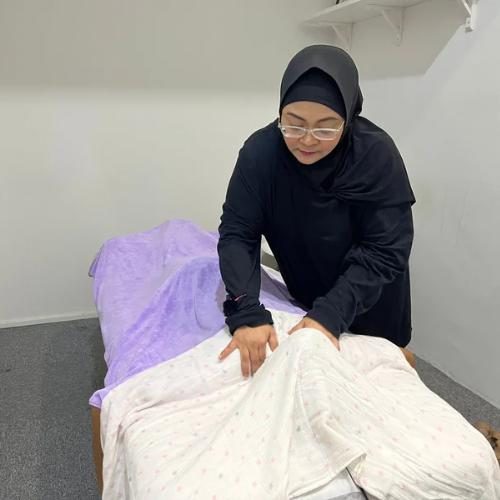
Postnatal Massage Care Package
During pregnancy and labor, the body undergoes muscle strain and ligament stretching. Postnatal massage can facilitate faster healing and improve overall comfort during the postpartum period.
Post Natal Massage with Chiropractic Care

Massage Packages
| Postnatal Massage | Costs (SGD) |
| 1x 90 mins Post Natal Massage Session | $280.00 |
| 5x 90 mins Post Natal Massage Package | $,1000.00 |
| 7x 90 mins Post Natal Massage Package | $1,270.00 |
** include Hot Thermal Fu Yang Kuan + Long Binding Cloth (Bengkong) + Slimming Cream
| Post Natal Slimming Packages | Costs (SGD) |
| 5x Pre Natal Care (60 mins) | $500.00 |
| 10x Pre Natal Care (60 mins) | $900.00 |
| Miscarriage Treatment Packages | Costs (SGD) |
| 3x 75 Mins Package | $450.00 |
| 7x 75 Mins Package | $840.00 |
About The Team
At our practice, you'll find a compassionate team dedicated to supporting mothers on their postnatal recovery journey. Led by Dr. Jenny, a Doctor of Chiropractic with over a decade of experience, we have a proven track record of providing comfort and positive outcomes for countless mothers. Dr. Jenny's expertise in chiropractic care has been instrumental in helping mothers navigate the challenges of postpartum recovery with ease.
Complementing Dr. Jenny's chiropractic expertise is Diana, our seasoned postnatal and massage therapist with over 20 years of experience. Diana's nurturing touch and extensive knowledge have brought relaxation and relief to numerous new moms, guiding them through their healing journey with care and compassion.
What sets us apart is our shared experience as mothers ourselves. Both Dr. Jenny and Diana understand firsthand the challenges and struggles modern mothers face in today's digital age. Drawing from their own experiences, they offer not only professional assistance but also genuine empathy and understanding. With us, you'll receive expert care tailored to your unique needs, provided by professionals who truly understand the journey of motherhood.

Testimonials
I could feel the body becomes lighter and relaxed after the first treatment. Satisfying results after the whole process. Diana is very friendly, helpful and professional. So it is easy to ask her questions. Will recommend her to friends and family
Ms. Mavis
I would come again to try more massage from Diana. Very good!
Ms. Nisa
Dr. Jenny Li is really experienced and is always willing to answer any questions I had for her. I learned a lot in just this two sessions I have with her. She will make sure you feel comfortable before starting the adjustment
Ms. Griz
First chiropractic experience and it was pleasant. I love how Dr. Li puts me at ease. Although I was sore the next day, my body definitely felt lighter. Can’t wait for the second session!
Ms. Zin

